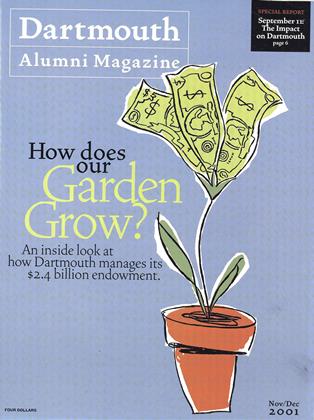Thanks to restrictive terms and simple bureacracy, as well as donor desires that are at odds with College plans, some endowment funds can't manage to get themselves spent.
Take the George Blodgett Burns Memorial fund, established in 1923 with $2,000. A scholarship fund for an enrolled student who graduates from Calais Academy in Maine, it hasn't distributed money since at least 1992, the last trackable date in the endowment administration office's computer system, and probably since its inception. With income and appreciation returning to the fund, it is now valued at about $477,000.
Why allow half a million to bubble up? The endowment office referred questions to the financial aid office, which said it didn't have a record of this scholarship. Sean Gorman, associate general counsel, said it's unclear how it would jibe with the College's current need-based aid system, where a Calais graduate with need would receive aid anyway. "The question is genuinely academic until there's an admitted student to Dartmouth from Calais," he adds.
Meanwhile, Sharon Howland, a graduate of Calais Memorial High School (which succeeded the academy after it burned down in
1945) and a Calais genealogist, is eager to see something come of the fund. "This is a poor area," Howland says. "This would be wonderful, if people would know about it. The, kids could use all the scholarships they could get."
The Richard Fletcher 1806 Prize Fund, established in 1909, is supposed to be granted to the author of the best essay on the subject of beneficent effects of Christianity. The prize has not been awarded for at least 10 years—again, as far back as the computer tracks. About $21,300 sits untapped.
The John M. McDonald 1940 fund, established in 1978, would pay for the Hood Museum to buy proof sets of minted coins. But the museum isn't collecting U.S. coins these days. So the money, distributed from the endowment, sits in a reserve account for now.
How can the College wriggle out of anachronistic endowment funds? It can seek legal relief from the terms in court, but that task is not a to-do-list topper in the general counsel's office. It's easier for the College to avoid the conflict altogether. Nowadays, under general policy, the terms of a gift must give the College the ability to decide alternate uses in the event that future circumstances interfere with the use of the income as the donor intended. In other words, flexibility takes precedence over dormancy.
 View Full Issue
View Full Issue
More From This Issue
-
 Feature
FeatureComing of Age in Hanover
November | December 2001 By KAREN ENDICOTT -
 Cover Story
Cover StoryHow Does Our Garden Grow?
November | December 2001 By JAMIE HELLER ’89 -
 Big Picture
Big PictureSeptember 11, 2001
November | December 2001 -
 Alumni Opinion
Alumni OpinionThe Ex-Wives Club
November | December 2001 By Regina Barreca ’79 -
 Article
ArticleSeen & Heard
November | December 2001 -
 Classroom
ClassroomIs There a Robot In the House?
November | December 2001 By KAREN ENDICOTT
Article
-
 Article
ArticleRecord Set by 92 Sons of Dartmouth Alumni in This Year's Freshman Class
November 1937 -
 Article
ArticleWITH THE BIG GREEN TEAMS
DECEMBER 1964 -
 Article
ArticleEager to Teach
July/Aug 2009 -
 Article
ArticleNorthern California
October 1959 By BASIL L. WINSLOW '20, "GENE" CARVER '50 -
 Article
ArticleHanover Browsing
March 1931 By HERBERT F. WEST '22 -
 Article
ArticleThayer School
June 1957 By WILLIAM P. KIMBALL '29

